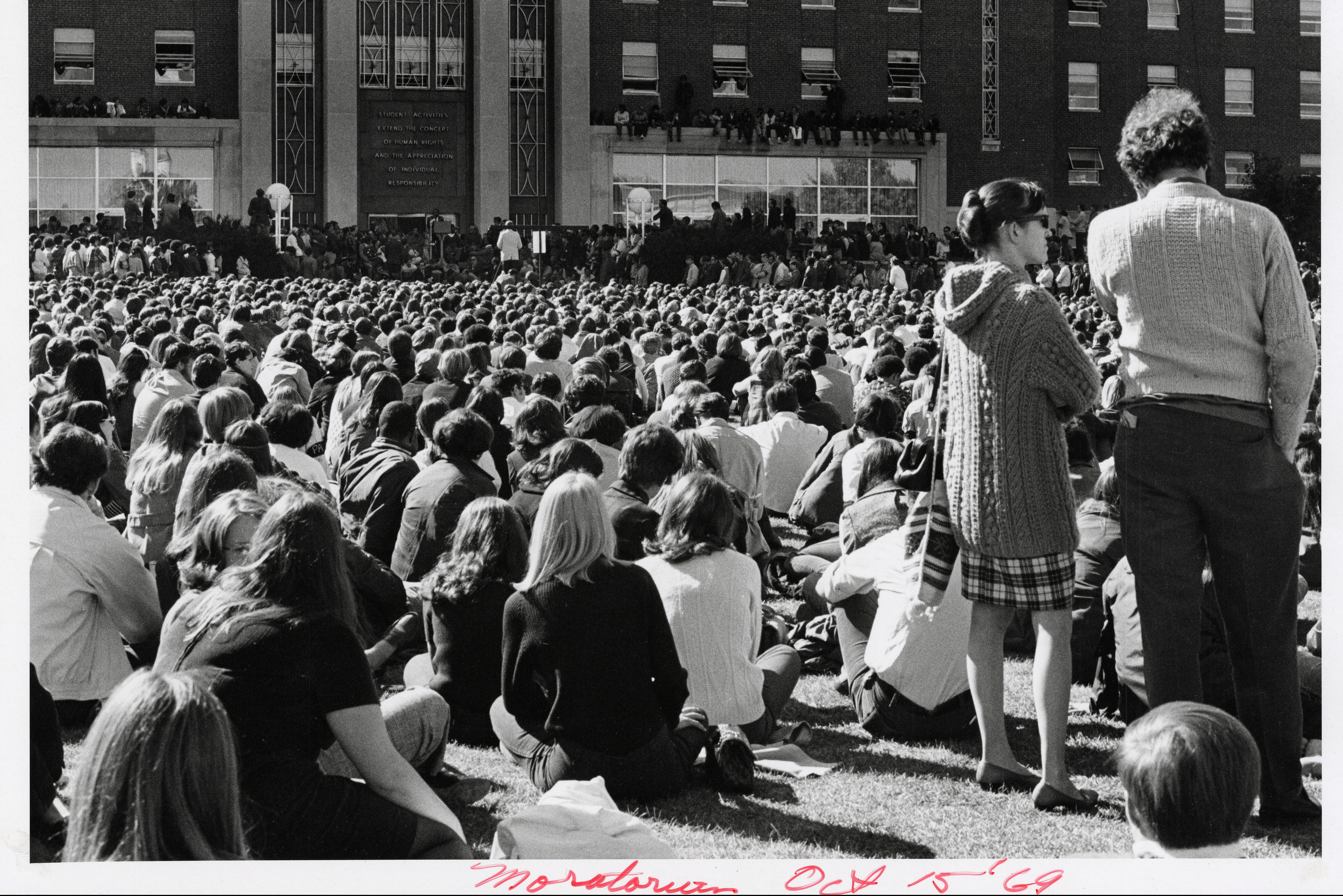The 50th anniversary of the Woodstock Music and Arts Fair and student activism on the UConn campus between 1967 and 1971 are the focus of “Day-Glo and Napalm: UConn From 1967 to 1971,” an exhibition on display in the Department of Archives & Special Collections in the UConn Library, located in the Thomas J. Dodd Research Center.
George Jacobi ’71 (CLAS) served as guest curator for the exhibition, which draws on materials from the Archives & Special Collections photography, periodicals and Alternative Press Collections along with personal items and narratives from alumni who attended the University’s main campus during a time of personal growth against a backdrop of turbulence in the United States.
“The 50th Anniversary of 1969 is more than an appropriate time for this exhibit; it’s also the last significant anniversary when many participants in this bit of history will be alive,” Jacobi writes in a reflective essay about the period posted on the Archives & Special Collections blog. “Most of the counter-cultural political drama at UConn took place between 1968 and 1970 – ’69 is a fitting centerpiece. Despite continued racial and anti-war protests, such communal events as the Woodstock Music Festival made 1969 almost feel like a short respite between the more violent bookends of the other two years.”
While Woodstock and the Apollo 11 moon landing were fondly recalled recently, the year 1969 fell between race riots in Detroit and Newark in 1967, the assassinations of Martin Luther King Jr. and Robert F. Kennedy in 1968, escalation of the war in Vietnam and the killing of four students by the National Guard at Kent State University in 1970 and the Attica prison riot, and the controversy over the publication in 1971 by the New York Times of “The Pentagon Papers,” which detailed the history of U.S. involvement in Vietnam.
Among the materials on display are copies of the Connecticut Daily Campus with coverage of the national student strike following the April 30, 1970 announcement by President Richard Nixon that the war in Vietnam was being expanded into Cambodia. UConn students protested in response, along with thousands of students at colleges and universities around the country.
The May 9 1970 Special Edition of the Daily Campus in the exhibit, published five days after the Kent State killings, lists demands from UConn student protesters that were presented to President Homer Babbidge, including: an end to “military-related activities” at the University; creation of a free day-care center for campus wage workers and others in the campus community; cancellation of final exams because of the strike; the dropping of all charges against those arrested during earlier demonstrations; and no layoffs or loss of pay to campus workers or staff as a result of the strike.
Along with newspapers and photographs, the “Day-Glo and Napalm” exhibit features memorabilia from student protests such as the 1962 Port Huron Statement by Students for a Democratic Society (SDS), posters for rock concerts including the December 1967 New Haven concert by The Doors, when lead singer Jim Morrison was arrested on stage, and a variety of LPs from the era including “Alice’s Restaurant” by Arlo Guthrie, “American Beauty” by the Grateful Dead, “Volunteers” by Jefferson Airplane, and “I Ain’t Marching Anymore” by Phil Ochs.
Jacobi also collected personal reflections from alumni and faculty who were on campus between 1967 and 1971, some of which are part of the exhibit and in guest posts at the Archives & Special Collections blog.
One of the submissions is from Ed Adelman ’71 ED, ’83 MA, who wrote: “Many of us felt the lessons learned by participating in political demonstrations taught us far more than our classwork. ‘The times, they are a-changing’ was not only a song but a belief and hope. Are we in better shape today than 50 years ago? Aside from the blip of the last 3 years, I think so and am anxious to see what today’s and tomorrow’s change agents will bring.”
“Day-Glo and Napalm: UConn From 1967 to 1971” continues through Oct. 25 in the gallery of the Thomas J. Dodd Research Center, 369 Fairfield Way, Storrs. The Dodd Center is open Monday through Friday from 9 a.m. to 4 p.m. For more information contact the Reference Desk in Archives & Special Collections at 860-486-2524 or archives@uconn.edu.



